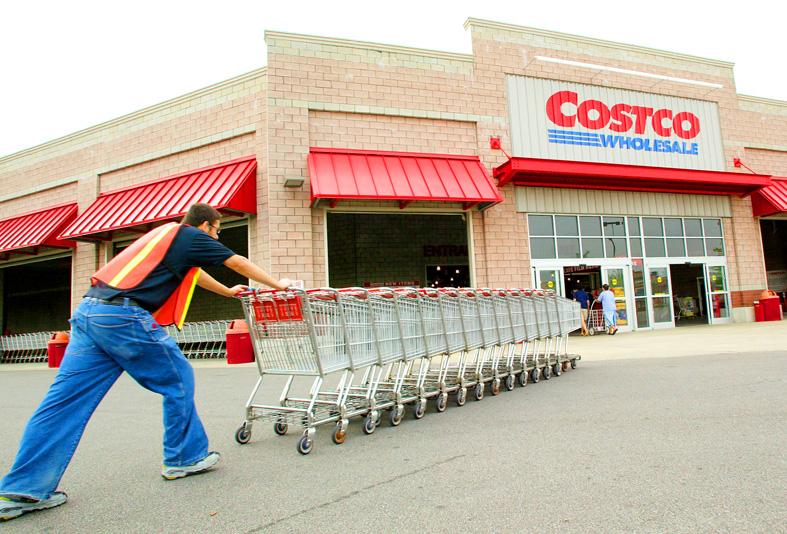US-based Costco Wholesale Corp on Thursday said that it had purchased the remaining 45 percent stake in Costco President Taiwan Inc (台灣好市多) for US$1.05 billion, making the local company a fully-owned unit.
“We estimate that the purchase would add about 1 to 1.5 percent to [our] earnings per share,” Costco said in a statement.
Costco President Taiwan was established as a joint venture with Kaohsiung-based President Group (大統集團), which held a 45 percent stake.

Photo: Reuters
Since the first Costco store opened in Kaohsiung in 1997, 14 outlets have been set up in Taiwan, company data showed.
PROFITABLE
Three Costco stores in Taiwan — in Taipei’s Neihu District (內湖), New Taipei City’s Jhonghe District (中和) and one in Taichung — were among the top 10 most profitable Costco outlets worldwide, the Chinese-language Liberty Times (the sister newspaper of the Taipei Times) reported.
Costco Wholesale operates 833 warehouses worldwide: 574 in the US States and Puerto Rico, 107 in Canada, 40 in Mexico, 31 in Japan, 29 in the UK, 16 in South Korea, 14 in Taiwan, 13 in Australia, four in Spain, two each in France and China, and one in Iceland, it said in the statement.
Costco Wholesale also operates e-commerce sites in Taiwan, the US, Canada, the UK, Mexico, South Korea, Japan and Australia, it added.
With PX Mart Co (全聯實業) having acquired RT-Mart International Ltd (大潤發) and Carrefour Taiwan (家樂福) reportedly seeking a local buyer, that could leave Costco as the only foreign hypermarket chain operator in the nation.

Merida Industry Co (美利達) has seen signs of recovery in the US and European markets this year, as customers are gradually depleting their inventories, the bicycle maker told shareholders yesterday. Given robust growth in new orders at its Taiwanese factory, coupled with its subsidiaries’ improving performance, Merida said it remains confident about the bicycle market’s prospects and expects steady growth in its core business this year. CAUTION ON CHINA However, the company must handle the Chinese market with great caution, as sales of road bikes there have declined significantly, affecting its revenue and profitability, Merida said in a statement, adding that it would

Greek tourism student Katerina quit within a month of starting work at a five-star hotel in Halkidiki, one of the country’s top destinations, because she said conditions were so dire. Beyond the bad pay, the 22-year-old said that her working and living conditions were “miserable and unacceptable.” Millions holiday in Greece every year, but its vital tourism industry is finding it harder and harder to recruit Greeks to look after them. “I was asked to work in any department of the hotel where there was a need, from service to cleaning,” said Katerina, a tourism and marketing student, who would

i Gasoline and diesel prices at fuel stations are this week to rise NT$0.1 per liter, as tensions in the Middle East pushed crude oil prices higher last week, CPC Corp, Taiwan (台灣中油) and Formosa Petrochemical Corp (台塑石化) said yesterday. International crude oil prices last week rose for the third consecutive week due to an escalating conflict between Israel and Iran, as the market is concerned that the situation in the Middle East might affect crude oil supply, CPC and Formosa said in separate statements. Front-month Brent crude oil futures — the international oil benchmark — rose 3.75 percent to settle at US$77.01

RISING: Strong exports, and life insurance companies’ efforts to manage currency risks indicates the NT dollar would eventually pass the 29 level, an expert said The New Taiwan dollar yesterday rallied to its strongest in three years amid inflows to the nation’s stock market and broad-based weakness in the US dollar. Exporter sales of the US currency and a repatriation of funds from local asset managers also played a role, said two traders, who asked not to be identified as they were not authorized to speak publicly. State-owned banks were seen buying the greenback yesterday, but only at a moderate scale, the traders said. The local currency gained 0.77 percent, outperforming almost all of its Asian peers, to close at NT$29.165 per US dollar in Taipei trading yesterday. The